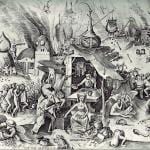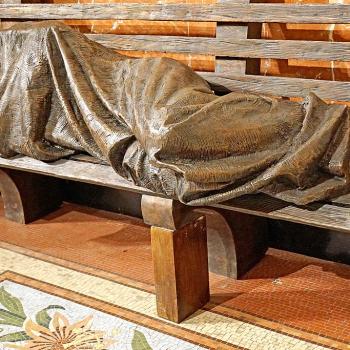
Source: Nick Youngson / Alpha Stock Images / http://www.picpedia.org/highway-signs/w/work.html
St. Salvian, talking about the horrors the poor faced in his day, could easily be talking about the current situation of American politics, where politicians seek personal gain on the backs of the public:
There is no greater pillaging of poor States than that done by those in power. For this, office is bought by the few to be paid for by ravaging the many. What can be more disgraceful and wicked than this? The poor pay the purchase price for positions which they themselves do not buy. They are ignorant of the bargain, but they know the amount paid. The world is turned upside down that the light of a few may become illustrious. The elevation of one man is the downfall of all the others. [1]
Those who have money use it to exploit the system, while those who have none find themselves barely living as they seek to make their way in the world. This is why workers rights are important. However, it is often their rights and needs which are the least protected. So-called right to work laws are not for the sake of employees, but for employers, to help disband and destroy unions. Combine such right-to-work laws with at will employment laws which make it very easy for workers to be fired (because there does not have to be just cause to fire a worker), workers have little to no protection from their employers as they have no one to protect their needs fighting for them. Workers will find, with the lack of basic protections, their employment will be even more at the whim of their employers, and if their employers like to take advantage of the system (and many of them do), they will suffer the consequences by having all kinds of unjust demands placed upon them if they want to keep their jobs.
The work environment as it is now is already bad. Things will only become wore for the average worker under the Trump Administration if they are able to force work requirements for those needing governmental aid and assistance. Workers will find out that if they are laid off from their job, they will get no aid; employers, knowing this, will find themselves holding even more power over the fate of their employees. The imbalance of power, which is already great, will become extreme. Employers will be able to take advantage of the opportunity given to them. They will be able to pay less for work, expect more out of their workers, telling those who ask for more that they can be easily dismissed and turned into the world without a safety net to protect them. Poor workers will lose health care benefits, food stamps for their family, indeed, all that is needed in order to survive if they lose their job. Workers, afraid of such a disaster, will less likely fight against their employer’s unjust demands, especially as the system has found a way to remove unions which otherwise would have fought for their rights. This is why the Pope has said labor unions are necessary for a just society: he knows they are the first line of defense for the worker in a world where the worker has the rich and powerful seeking ways to undermine their rights. They allow workers to come together to have some power to balance the power employers otherwise wield against them.
It is not difficult to predict what is going to happen if Trump’s plan is put into effect. He has already given more wealth and power to the rich, but because he has caused a great deficit, he now wants to pay for it on the backs of the poor. He does not care for the poor or needy; he does not care for or understand the plight of the general American worker.
“Open your mouth, judge righteously, maintain the rights of the poor and needy” (Prov. 31:9 RSV). We are to speak up for the poor and needy, to make sure they are not exploited. Justice, social justice, is not secondary to the faith. “Do not withhold good from those to whom it is due, when it is in your power to do it” (Prov. 3:27 RSV). Workers, finding their work devalued because the system gives every advantage to employers, will suffer greatly at the hands of Trump’s suggested budget plans. What Trump wants for the American people is unacceptable: it is a crime which cries up to heaven. Social welfare, protecting the vulnerable, especially in a society in which more are becoming vulnerable as workers themselves are becoming less in need, requires more expectation on those who possess wealth and resources, not those who are barely surviving due to circumstances beyond their control. Wealth can be better distributed; workers’ rights can be protected, so long as employers do not follow avarice in its disregard for humanity. It is cruel to eliminate those rights, to give employers all the advantages, turning workers, those who are lucky enough to get work, slowly into slaves with little to no rights of their own.[2]
Right to work should stand for the rights of workers to get and maintain work without unjust burdens placed upon them: right to work is promoted by unions, not by their elimination. Right to work is not upheld when “at will” employment laws are in effect, because there is little to no right given to the worker. No one there able to protect them when employers try to figure out how best they can exploit their workers by giving them the least amount of money for the greatest amount of labor possible. With the system which is in place, workers at least had some respite, some expectation of protection from the government so that employers felt they at least had to maintain some standard in order to keep workers at their place of employment. With the Trump Administration no longer backing the worker, but rather, backing the rich and powerful, it does not take a prophet to foresee the decimation of human dignity and life which is to come if Trump gets as he wishes.
Let us therefore tell Trump, and those who will promote his budget, “no” in no uncertain terms before it is too late.
[1] St. Salvian the Presbyter, “The Governance of God” in The Writings of Salvian the Presbyter. Trans. Jeremiah F. O’Sullivan (Washington, DC: CUA Press, 1962), 97-8.
[2] This is not to say workers today are in exactly the same situation as slaves of the past, but rather, the slow erosion of their rights will end with the return of such slavery (even if the name is changed in order to say that there is no slavery).
Stay in touch! Like A Little Bit of Nothing on Facebook












